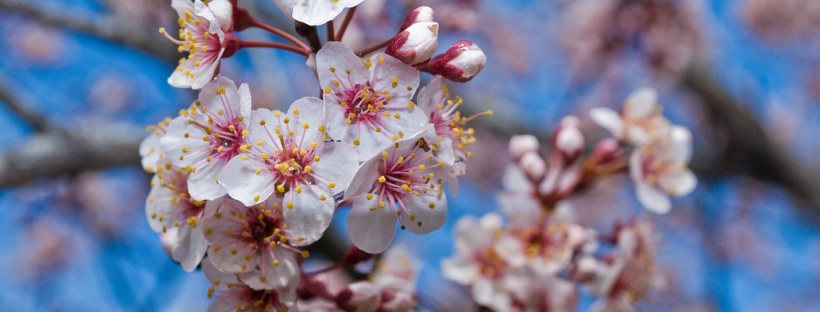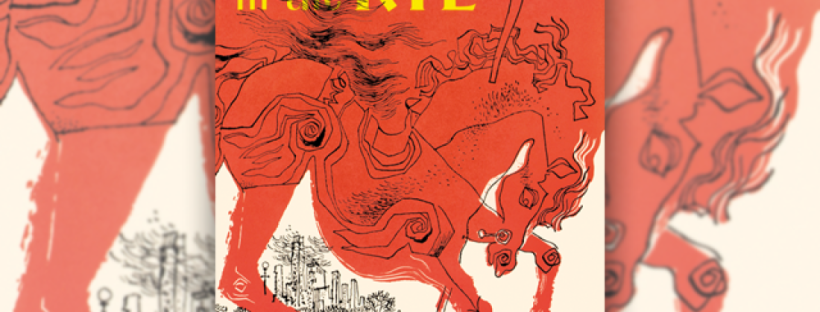My thoughts are filled with one thing like a lovestruck girl. But in my case, it’s not a crush; it’s something heavier and more serious: the past. Rumination has become a bad habit of mine. I look at the past and find so many things that I label as regrets that I find myself stressed and unhappy.
One year of college has faded away into my memories, and I find myself wishing that I had done more. I should’ve taken advantage of more opportunities, whether in the form of meeting new people through activities and organizations or gathering experience through an internship over the academic year. I feel like I did nothing over the past year. Time flies by so fast; I don’t want my next three years to be like my first. I feel like I’m doing college “wrong.” Then I ask myself, is there a right way?
I need to start chasing away the shadows in my memories and find the numerous blessings scattered throughout. I remember baking cake pops with my friend in the small kitchen in the dorms for a class. I remember laughing so hard when my friends were playing Just Dance in the living room of upperclassmen’s suite. I remember being so grateful when my closest friend ate dinner at 4pm with me in the empty eating hall since my work started so early and ended so late.
Maybe I am doing college right.
New Start
It’s been awhile since I’ve started writing about my life again. It feels strange, almost foreign, to shape my thoughts and experiences into words again. However, I know that once I start typing, words will flow out like a stream from my consciousness.
I have finished my first semester of college. I’m almost finishing my second semester. A lot of memories have stacked up inside of me, bad and good. I have met people with fairly different opinions than me, and I admit that I struggled to accept their thinking. I’ve clashed with people but also met people who genuinely cared about me. I started to understand why people call attending college an “experience;” I learn so much about how humans think. College life is a strict but effective teacher.
There are times when a lot of work stacks up and I feel overwhelmed. There are times when I feel lonely and depressed. However, there are times when I laugh and have fun with friends, such as going out to eat good food. There are times when I achieve something, such as finishing a good presentation. Whenever times are rough, I find myself looking to the future. When I have an exam coming up, I think of the showcase I’m going to with my friend afterwards and that thought keeps me going. Think of happy things. Look forward to the good things. That’s how I’m living college.
A year passes by fast. However, I’m looking forward to my next three years.
Fleeting Flower
In the spring, it snows in Korea. However, the snow is not just white but also a light pink. It is not biting cold; it is soft. The flurries symbolize the freshness and romance that bud as the season turns warmer. They are cherry blossom petals. Thousands flock to the cherry blossom orchards to catch a glimpse of the white and pink wonderland.
I don’t know why my favorite flower is the cherry blossom. Maybe I, too, am drawn to its dainty beauty that is so pleasing to the eye. Maybe I’m drawn to its Oriental heritage that gives me a sense of pride. However, the cherry blossom is a fleeting flower. It blooms from late March to May – only a couple of months or so. Then shouldn’t I prefer a flower that is strong and timeless – for example, a dandelion?
For me, despite its aesthetically-pleasing appearance, the cherry blossom embodies sadness. Nothing is eternal under the unchanging skies. The cherry blossom is one example of that. Every moment has the ability to be wonderful, but they all are fleeting.
However, the cherry blossom comes back to greet us every year.
Of Criticisms and Maturity
Although my passion for devouring books slowly waned as I grew, I still enjoy works that seem to be superior readings in my opinion; in other words, books that really make me think. A couple of these are “The Little Prince” and “The Lord of the Flies”, which I strongly recommend for readings this summer. The latest book that made me exclaim in wonder was “The Catcher in the Rye.” I understand that it is banned in most schools due to its foul language and depressing themes, but it is truly a magnificent work if you can get to the deep meaning hidden in the context. I have written an analysis of it to the topic of “Does Holden seek truth or an explanation of the hypocrisy he sees?”
In this book, Holden Caulfield criticizes the adult society’s norms of materialism and conformity through the eyes of a teen that is wistful of his childhood innocence. However, although he exemplifies a mature aspect in that he understands the faults of society, he is somewhat immature in the aspect of failing to seek the truth or an explanation of the hypocrisy he sees. Therefore, I believe that Holden is a level-two thinker.
At the first level are the people who do not question society’s materialistic norms and conform to them blindly, such as Mr. Haas, the headmaster of Elkton Hills, who was “charming” to the successful-looking parents and impolite to those who looked like they were from a lower class. The first level is made up of “phonies”, as Holden refers to them negatively throughout the book. They are the subjects of Holden’s criticisms.
Holden is at the second level because he is aware of the faults of society enough to be able to criticize norms and not conform to them. However, he lacks the will to search for an explanation and a way to change the norms, which distinguishes him from a level-three thinker. He admits that he is “yellow” and a coward, and while it can be interpreted as him being a pacifist as in the situation with the gloves, it also implies that he does not frequently act in situations exemplifying society’s ills and avoids confrontation. Frequently, he just observed and criticized, such as in the night club with the dancers when he looked down on them for searching for celebrities but said nothing. However, he shows some promise of moving into the higher level when he finds the courage to erase the “Fu** you” writing on the wall of his old school.
The level-three thinker was shown in Mr. Antolini’s quote: “The mark of the immature man is that he wants to die nobly for a cause, while the mark of the mature man is that he wants to live humbly for one.” The “mature man” is at the third level, while the “immature man” is at the second. The similarity between the level-three thinker and Holden is that they both can find faults in the human behavior of the society of their time. However, the level-three thinker grows intellectually by making use of their resources in education and learns from others while writing records to teach others. This type of thinker is more valuable in that he or she tries to find the truth behind human nature and expresses it clearly – the level-three thinker is a true scholar. Mr. Antolini, who finds potential in Holden, tries to guide him towards the right direction. However, at the end of the book, Holden fails in that aspect. He dreams of becoming the “catcher in the rye”, in other words, the savior of innocence, but doesn’t go beyond that. Maybe he does not yet understand the deep implications of Mr. Antolini’s advice.
Compare and Contrast Essay
If you walk into a flower shop, a vast burst of color might greet your eyes. The burst of color is orchids, whose unique shape captures your vision. When you exit the shop and walk down the sidewalk, you might be able to spot a dandelion who has found success in fighting its way out of a crack in the concrete. Despite the fact that both flowers have long, slim stems and leaves that grow from the bottom of the stems, the similarities end there. They are polar opposites from inside to out.
Orchids are known to be beautiful, exotic creatures. They come in numerous colors, from soft pastel pink to vibrant neon orange. Coveted by people for weddings or gifts, their beauty is admired. However, despite being quite rare, their method of reproduction is common to that of most flowers. In order to preserve their bloodline, they tempt bees and fruit flies with their visual appeal and rely on these flying creatures for pollination. They are also dependent on other ways. Some orchids, called mounting orchids, need trees to grow on. Attaching their roots to their host, they grow with its support. Others, being delicate and dainty, require special care and attention to blossom.
On the other hand, dandelions, with their fluffy heads of either yellow or white, can easily be glimpsed in a spring or summer carpet of green outside. Being one of the most common flowers does not add to their popularity; some people scorn them as “weeds” and label them as “plain.” However, although they may not be a gift for loved ones, they are in important in other ways, as medicinal purposes. Also, their method of reproduction is unique. They require nothing but the wind; on a windy day, their white heads slowly disappear as their seeds are cast far away to begin a new generation. In addition, their lifestyle is very independent; being stronger and sturdier than most flowers, they can grow almost anywhere with little help.
The orchid is a lovely, dainty thing that is soft to its core. Needing assistance and special care, she is a princess that cannot live by herself. On the other hand, the dandelion is a robust flower that can withstand tough circumstances. These two flowers have a spark inside of them that speaks of life. However, the dandelion is the one that is successful at achieving the essence of life: survival. Despite its plain appearance, it has what counts inside. Appearance isn’t everything.
Chair of Passivity
This is my speech from an original oratory competition in February. Please comment and tell me what I could’ve done to make it better.
In middle school, I witnessed the first fight in my life. It was like those fights in movies like “Mean Girls” where two girls acted like a pair of angry cats. Apparently, one of the two girls had bullied the other, and it had turned into a not-so-pleasant scene of pulling hair and pulling clothes while screaming several profanities that I cannot add into this speech in fear of damaging your ears beyond repair. I was standing in the crowd of students who were pushing to the front to get a better look. Well, that day I learned that people do actually chant, “Fight! Fight!” during a fight. But what I also learned was that despite not being related to the fight in any way, I had committed a crime. I had been a bystander.
One of the few things that we actually get out of grade school is the fact that when you see bullying or fighting, you should immediately let a teacher know and get help pronto. If you do nothing, you are in the wrong also. I’m pretty sure you all know the term for the person just watching and doing nothing: a bystander. However, what we don’t seem to know is that this does applies not only to bullying situations but also to real life.
How many times have we found ourselves wanting something but stopping at that very thing: wanting? How many times have we found ourselves looking at a problem but lacking the will to take action? We just watch the Earth turn on its axis and do nothing – like bystanders.
Most of you are probably currently sitting in a chair as bystanders. And no, I don’t mean that literally, but figuratively, as in the chair of passivity. In my speech, I will open the doors to our current problem of passivity and close them only after letting you in on how it can be solved and the benefits that come from that. By the end of this speech, I hope to convince you to stand and walk out with the will to change.
I’ll start with one of the hottest topics of last year: the 2016 presidential election. According to exit polls during the election, when voters were asked which of four qualities was the most important in deciding who to vote for, 39 percent of the voters picked the top response: can bring needed change. The desire for change apparently trumped other factors.
Peter Funk, a New Jersey businessman, told ITV News, “People obviously wanted change. And Trump seemed to be the absolute ‘wildcard’ being seized upon as an agent for change.”
However, this is not a new phenomenon. During the 2008 Presidential campaign, Obama’s slogan that placed him in the White House was “Hope and Change.”
Yes, we want change. Yet what have we been doing other than electing President after President in the hopes of a better future?
Here is an iconic quote by John F. Kennedy. “My fellow Americans, ask not what your country can do for you, ask what you can do for your country.” It was said less than a century ago, yet during those years what have we done? Other than posting Tweets and Facebook messages complaining about our current situation, we have sat there in our chairs of passivity, hoping that higher powers would rescue us like Superman. Well, let me tell you a secret: Superman does not exist. Sorry for ruining the childhood dreams of some of you out there.
Now let’s look at this issue on a global scale. As globalization is dominating our lives, we cannot blatantly ignore the plights of various different places dotted across the globe. Numerous places scream for change, from starving people in Haiti to the havocs in Syria. Yet although we don’t close our eyes to their problems, we aren’t reaching a hand out to them either. We surround ourselves with lies, lies made up to excuse our behavior, but lies nonetheless. I don’t have time. I don’t have enough resources. I don’t have the ability. Whatever we say, the conclusion is the same: we are all bystanders.
So stop. Stop being a bystander. Transition from being passive to active. Don’t wish for change; be the change. Since William Shakespeare had said, “All the world’s a stage,” let us be the main characters of this theatre, not the audience. Lights. Camera. Action.
And then you might ask me, “Well, what can I do?” First, let me chase away those pesky little doubts buzzing around in your head. You are not too young. You are not powerless. You are not inept. If you can believe, you can try, and if you can try, you can make a difference.
The butterfly effect theory, coined by the American meteorologist Edward Lorenz, states that when a butterfly moves its wings somewhere in the world it can cause a tornado in another part of the world. Well at first, it sounds kind of silly. If a flap of the wings of one little insect could bring about a huge storm, when someone sneezes, wouldn’t we be saying “Oh, there goes Alaska” instead of “Bless you?” But looking at it in a social context, this theory means that a small, unnoticeable change, like the flutter of a butterfly’s wings, can cause a huge impact.
Let’s take Ben Rattray, for instance. He was just your average guy from Santa Barbara who was pursuing a career in finance. In 2007, he launched a little website called change.org. Now it has grown and brought such an impact onto the world, such as raising awareness to save lives in Aleppo through online petitions, that it is now known as the platform of change. And the start of it all? One ordinary person who took action. One ordinary person who refused to be a bystander. This shows how ordinary people (a.k.a. you and I) can have the extraordinary power to change the world.
Now close your eyes and imagine thousands, no, millions of butterflies across the world. And each one of these butterflies can bring about a colossal amount of change. How much brighter would the future be?
If we start to rise together, dream together, strive together, we can create that future that is as magnificent as the rising sun. Let me end this speech with a section from one of the most famous songs of all time: John Lennon’s “Imagine.” You may say I’m a dreamer. But I’m not the only one. I hope someday you’ll join us. And the world will be as one. Thank you.
Happiness Coexists with Grief
“There is neither happiness nor unhappiness in this world; there is only the comparison of one state with another. Only a man who has felt ultimate despair is capable of feeling ultimate bliss. It is necessary to have wished for death in order to know how good it is to live…..the sum of all human wisdom will be contained in these two words: Wait and Hope.”
― Alexandre Dumas, “The Count of Monte Cristo”
“The Count of Monte Cristo” is one of my favorite books of all time.Not only does Alexandre Dumas weave a fascinating story of revenge, he peppers his book with striking quotes. My favorite quote from the book is the one above. What is happiness? Happiness is a state of mind that is unique from individual to individual. If you have suffered the bleakest, darkest situation, you will be able to appreciate the wonder of the ray of sunshine signifying happiness. Even if you are suffering right now, don’t worry. Every moment of happiness with taste just as sweeter, for you have endured pain to compare it with.
“When you compare the sorrows of real life to the pleasures of the imaginary one, you will never want to live again, only to dream forever.”
― Alexandre Dumas, The Count of Monte Cristo
Whenever you find yourself dreaming of what could’ve been during a depressing situation, stop yourself. It won’t help your situation at all; you’re only going to get more depressed. You should try your best to climb your way out of the situation and/or look to the future with hope. I know this is not easy; I’ve had plenty of trouble not being able to stop regretting and wistfully imagining. Now I try to look up at the sky and smile as I feel the warm rays of the sun on my face – it’s the little things in the present you have to be able to appreciate.
Helpless
Volunteering can give you many experiences. It offers you an insight into unfamiliar environments, thoughts, and values. But not all of these “experiences” can be fascinating and full of wonder; some can be heavy and painful.
I volunteer at the education department of one of my county’s non-profit organizations every week after school. It is homework help for elementary school students in a community center at a neighborhood known to be the home of many families that have low income.
I help first, second, and third graders do their math homework, and then we all go outside to play. The children are so adorable and very welcoming. They love attention and, apparently, Skittles.
One afternoon, I was outside watching a few girls playing soccer in the parking lot and making sure they didn’t run off to chase the ball when it rolled into the street. I suddenly saw a boy and a girl playing with a chair with wheels on the hill-like road in the neighborhood leading to the big street. I frowned. If they happened to lose control and roll into the street, it would be bad – no, terrible and horrifying.
I went to them and told them to stop, that it was dangerous. The boy looked straight at me and said, “I don’t care. I like pain.” A chill ran up my spine. That was something I would’ve never expected. I was speechless for a moment, and then sternly told them to stop because of the drastic consequences.
Later, I saw them at the top of the hill-like road, near the huge neighborhood trash bin, playing with a shopping cart. As soon as they saw me walking towards them with a stern face, they quickly pushed the cart (which was probably an abandoned one they found) behind the trash bin.
I told them that they could kill themselves playing with things with wheels on the road. The boy came up to me and said, “Then we’ll just die.” Then he proceeded to show me his crooked finger and told me that he had gone through a lot of pain and enjoyed it. He wasn’t afraid of killing himself, much less hurting himself.
He was 12. I was beyond shocked to hear such words come from such a young child’s mouth. I asked for their names (and found their real names from other children) and went to the manager of the neighborhood’s community center. I asked him to dispose of the shopping cart and chair with wheels properly and told him that I was worried about the two kids. He told me he’d go dispose of them right away.
However, I didn’t feel good inside at all. I knew that what I asked for was just a small, meaningless thing. Even if those items are gone, the children’s mindset would be unchanged. They will find more ways to hurt themselves, and I would be helpless to help them. I felt like I was about to cry. They were young – they might’ve grown in the wrong environment that made them care little about their own lives. I had heard from the manager of the organization that I might meet children from abusive families.
I wanted to help. Yet I didn’t know how.
Three Day Quote Challenge: Day 3
Sorry I was a day late!! I would like to share some quotes I made up myself along the journey of my life.
Youth is a state of mind that applies to all ages.
When people use the word “youth,” they naturally picture liveliness and hopefulness. I believe that it doesn’t only apply to young people. Anyone can be in that state if they changed their view of the world to one of wonder and curiosity. Be youthful today.
Stubborn isn’t about saying “no;” it’s saying “yes.”
When I was young, I would think being stubborn was being arrogant and dogmatic. As I grew, I redefined it as being persistent and moral. Stubbornness is a valuable trait in life. You must stick to your values and goals. You must believe that you can do it.
The stars may be currently covered by a black cloud, but remember that they are still there, waiting for the cloud to pass.
This is my current outlook towards life. No matter how gray or blue right now seems, I know that life will soon get better. When something good happens, I must be thankful for it but not be obsessed about it. My journey has its ups and downs – with a down comes an up and vice versa.
Three Day Quote Challenge: Day 2
Today I’ll like to share some quotes from one of my role models, Greg Mortenson. He is the co-founder and former executive director of the Central Asia Institute, which builds schools for children (especially girls) in Pakistan and its neighboring countries.
Really, what education does is it gives opportunity, but it also gives hope.
I say if you fight terrorism, it’s based on fear, but if you promote peace, it’s based on hope.
I am a huge advocate of education for all children in the world. I believe that education could be part of the key to solving poverty and terrorism. I’ve also participated in a speech competition with this topic on UN Day in Korea as a finalist. For those interested in reading my thoughts about education and terrorism, read the speech below.
Dear Honorable UN Secretary Ban Ki Moon,
Considering the recent global issue of ISIS, I, including millions of high school students not only in my country but all around the world, have been aware of the major problem that is labeled as “terrorism.” From the news, we have heard about people around our age who join this violent force and the slaughter of millions. However, this problem is not limited to Islamic extremism. Terrorism is an issue that transcends time periods and concerns human rights.
I believe that in order to solve terrorism, instead of eliminating major terrorists one by one, we should dig out the root of the problem. I declare that lack of education is one of the major causes of terrorism. Young people who are vulnerable to the temptation of joining terrorist forces should be taught that there is a better way to commit themselves to the world, that there is a better way for them to have their voices heard. The following is a quote from Greg Mortenson, the co-founder of the Central Asia Institute, a non-profit organization that builds schools for children in Central Asia. “If we try to resolve terrorism with military might and nothing else, then we will be no safer than we were before 9/11. If we truly want a legacy of peace for our children, we need to understand that this is a war that will ultimately be won with books, not with bombs.”
In order to put this into effect, first, we should reach out a hand to the people around our age that cannot be reached. The UN should install a communication program for students around the world, including the poorest corners of Earth, to be able to share their thoughts and ideas with each other and be heard. Since young people will be allowed to broaden their thinking and develop their own perspectives, this is a valuable education method.
Second, the UN should generously support and fund non-profit organizations that work to provide education to children in under-developed countries. There should be more schools built and teachers hired in order to create a learning environment for them.
Last but not least, ethics should be a must in the educational curriculum. Children everywhere should learn about human rights and develop moral reasoning. Then they will fully comprehend the consequences of terrorism.
I know that I am one voice in millions. But as one of the thousands that understand the gravity of terrorism, I raise my voice today in the hopes that it will be heard and the UN will put more interest in providing education to fight terrorism. This may be a drop in the ocean, as the quote goes, but one day the ocean will be big enough to bring peace on Earth.
Sincerely,
A High School Student in the Fight for Peace
Note to readers: I know that some of you might go Google up Greg Mortenson. I was introduced to him when I read the amazing book “Three Cups of Tea,” and he became my hero when I was young. However, it was only later when my reverence towards him somewhat crashed because of his scandals with using money from CAI for private issues and the alleged lies in some of his books. Well, having a role model doesn’t mean I want to be exactly like him. He still had dedication and motive during the start and that’s what I would like to learn from him. I promise that I won’t go in the wrong direction as he supposedly did.









